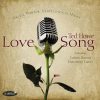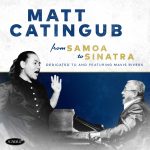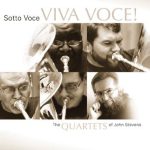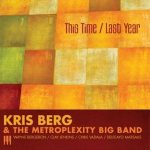Giacomo Gates

Biography
“Mr. Gates is a solid example of a performer who is doing something that no one else does. He evokes an age (that I would hope is not so terribly bygone) when musicians were entertainers and entertainers were musicians, and a sense of humor was as important as a sense of rhythm.” Will Friedwald in The New York Sun.
Giacomo Gates does more than sing “a bunch of songs.” He is truly an entertainer, for all ages and styles, as audiences enjoy the music, the interaction on the bandstand between him and his musicians, the spontaneity, the humor, the stories about the music and composers, along with their relation to everyday life. People are smiling, having a good time, while thoroughly enjoying the music. What usually lacks in most of today’s performances is obviously present… fun!
In his own words, “In this kind of music it’s about intention, honesty and what comes through in your voice – the Experience of Life.” Without question, Giacomo’s life experience is unlike any other jazz artist that may come to mind. Blessed with a full-bodied and mellifluous voice, extraordinary rhythmic precision and an unerring sense of lyricism, Gates’ total command of the vernacular, boundless creativity and exuberant passion set him apart from nearly every other vocalist on the scene. However, he didn’t display his talents to the public-at-large until 1990.
Prior to that, Gates led the life of a hardworking blue collar “man’s man.” After a few years of working road construction as a laborer, tractor-trailer driver and bulldozer operator, Giacomo departed for the Alaskan wilderness in 1975, working for 14 years in a variety of jobs, including three years on the Alaska Pipeline. Whether he was doing road construction, operating scrapers, loaders and bulldozers, or driving spikes into railway tracks in the flatland emptiness of the tundra with no directional guides other than a compass and the sky, Gates found these experiences to be powerful stimulation for developing his own artistic expression.
Dizzy’s”Two things always struck me out there,” Giacomo says of that experience, “feeling insignificant and feeling very alive.” With severe risk to life and limb from all sorts of dangers ranging from geographic disorientation to heavy machinery accidents to hungry polar bears, Gates was confronted with sights, sounds and experiences that had a profound effect upon his being, and therefore his art.
Although he had always been exposed to music since early childhood, singing and playing guitar through his teenage years, it was for the love of the music, not as a vocation. There were no real opportunities to perform in Alaska until nearly the end of his time there. Looking for growth and development even as a construction worker, Gates would occasionally leave Alaska to spend time in places like Washington State, Louisiana and Arizona, working on new projects and learning the use of new equipment. In these environments, he would perform whenever possible, sitting in on a variety of musical activities. In the late ’80s, he had many opportunities to do the same in Fairbanks, Alaska. After much encouragement from local and visiting performers, Giacomo decided to return to his native Connecticut and devote full attention to music.
Like his mentors, Gates would sometimes translate great instrumental solos into Vocalese, including the works of Thelonious Monk, Lee Morgan, Dexter Gordon, Chet Baker, Gene Ammons, Charlie Rouse and many others, also penning lyrics to classic jazz compositions. In citing his influences, Giacomo states “Some of my favorite singers are Dexter Gordon, Ben Webster and Lester Young. They were singing through the horn. If that isn’t singing, I don’t know what is!”
From that perspective, Giacomo sometimes vocalizes as an instrument – trombone, trumpet, bass and even drums. There’s no contrivance or gimmickry for its own sake involved in this, as it’s entirely conceived within the context of the music. Originally developed while working a steady duo gig with a pianist in Connecticut, Giacomo would improvise bass lines or drum sounds in support of the piano solos. Invited onstage by Jon Hendricks during a performance in 1995, Gates sang drums to Hendricks’ bass accompaniment of the pianist. After that, the ‘instrumental version’ of his vocal became part of his program.
In June of 2004, Giacomo and Andy Bey joined Mark Murphy and Kurt Elling in Europe, performing with Kurt Elling’s The Four Brothers vocal ensemble. Giacomo has also performed with such notables as Lou Donaldson, Freddie Hubbard, Richie Cole, Rufus Reid, Randy Brecker, Jon Faddis and many other world class performers. His primary focus has been leading his own groups, which has taken him all over the U.S. and other parts of the world.
Playing major U.S. clubs, New York’s Birdland, Smoke, Jazz Standard, Blue Note, and Dizzy’s, Philadelphia’s Chris’ Jazz Cafe, Blues Alley and The Kennedy Center in D.C., Scullers in Boston and Snug Harbor in New Orleans, Dazzles in Denver, The Jazz Bakery in LA, Pearl’s in San Francisco; and major festivals like Detroit/Montreux, Telluride, Caramoor, Sedona, Rochester, Syracuse, Clearwater, Fairbanks Summer Arts, California’s Jazz at the Plazz, and New York’s Lost Shrine Series; and at countless universities and jazz societies, Giacomo’s enormous appeal and popularity are obvious from the many repeat engagements he has had at these venues.
His international touring includes several tours of Russia, Italy and Belgium, teaching in Europe, three Australian tours and doing a Coca Cola commercial in Madrid.
Gates has six heavily acclaimed CDs, with his most recent release, Miles Tones – Giacomo Gates Sings The Music of Miles Davis, garnering rave reviews and topping the National Jazz Radio Playlist at #1 for four weeks! He is currently performing this material at major festivals, this summer and fall.
His preceding CD, The Revolution Will Be Jazz, The Songs of Gil Scott-Heron, was #1 for six weeks on the National Jazz Radio Playlist. Both CD’s spent over three months in the top 20 of the Jazz Week charts, on over 300 stations.
Heavily committed to education, Giacomo teaches regularly at Wesleyan University, Southern Connecticut State University, Sacred Heart University and New Haven’s Neighborhood Music School and has conducted workshops and residencies at numerous educational institutions all over the U.S.
Like all seriously committed jazz artists, Giacomo Gates is a student of the music’s great legacy. Known for his interaction with audiences through witty patter and informative introductions, every performance becomes a fun lesson in jazz history.
Giacomo’s sheer joy, exuberance, wit and unlimited creativity make him one of jazz’ most compelling artists.








